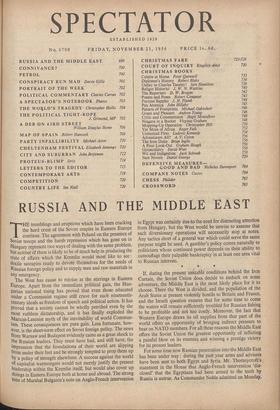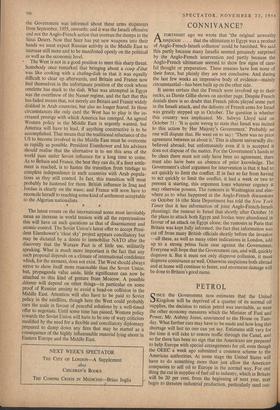RUSSIA AND THE MIDDLE EAST
THE tremblings and eruptions which have been cracking the hard crust of the Soviet empire in Eastern Europe continue. The agreement with Poland on the presence of Soviet troops and the harsh repression which has gone on in Hungary represent two ways of dealing with the same problem, but neither of them is likely to be of much help in producing the state of affairs which the Kremlin would most like to see : docile satrapies ready to devote themselves for the needs of Russian foreign policy and to supply men and raw materials in any emergency.
The West has cause to rejoice at the stirrings in Eastern Europe. Apart from the immediate political gain, the Hun- garian national rising has proved that even those educated under a Communist regime still crave for such nineteenth- Century ideals as freedom of speech and political action. It has proved that a society cannot be wholly petrified even by the Most ruthless dictatorship, and it has finally exploded the Marxist-Leninist myth of the inevitability of world Commun- ism. These consequences are pure gain. Less fortunate, how- ever, is the short-term effect on Soviet foreign policy. The news from Warsaw and Budapest evidently came as a great shock to the Russian leaders. They must have had, and still have, the Impression that the foundations of their world are slipping from under their feet and be strongly tempted to prop them up by a policy of strength elsewhere. A success against the world of capitalist warmongers would not merely justify the present leadership within the Kremlin itself, but would also cover up doings in Eastern Europe both at home and abroad. The strong tone of Marshal Bulganin's note on Anglo-French intervention in Egypt was certainly due to the need for distracting attention from Hungary, but the West would be unwise to assume that such diversionary operations will necessarily stop at notes. Any tactics short of a general war which could serve the same purpose might be used. A gambler's policy comes naturally to politicians whose continued power depends on their ability to camouflage their palpable bankruptcy in at least one area vital to Russian interests.
If, during the present unstable conditions behind the Iron Curtain, the Soviet Union does decide to embark on some adventure, the Middle East is the most likely place for it to choose. There the West is divided, and the population of the Arab States at present violently hostile to Britain and France, and the Israeli question ensures that for some time to come the waters will remain sufficiently troubled for Russian fishing to be profitable and not too costly. Moreover, the fact that Western Europe draws its oil supplies from that part of the world offers an opportunity of bringing indirect pressure to bear on NATO members. For all these reasons the Middle East offers the Soviet Union the greatest opportunity of inflicting a painful blow on its enemies and winning a prestige victory for its present leaders.
For some time now Russian penetration into the Middle East has been under way : during the past year arms and advisers have been sent to both Egypt and Syria. Mr. Thorneycroft's statement in the House that Anglo-French intervention 'dis- closed' that the Egyptians had been armed to the teeth by Russia is untrue. As Commander Noble admitted on Monday. the Government was informed about these arms shipments from September, 1955, onwards; and it was the Israeli offensive and not the Anglo-French action that overran the dumps in the Sinai Desert. Now that Suez has put new weapons into their hands we must expect Russian activity in the Middle East to increase still more and to be manifested openly on the political as well as the economic level.
The West is not in a good position to meet this sharp threat. Somebody once remarked that bringing about a coup d'etat was like cooking with a chafing-dish in that it was equally difficult to clear up afterwards, and Britain and France now find themselves in the unfortunate position of the cook whose omelette has stuck to the dish. What was attempted in Egypt was the overthrow of the Nasser regime, and the fact that this has failed means that, not merely are Britain and France widely disliked in Arab countries, but also no longer feared. In these circumstances the only card the West has to play is the in- creased prestige with which America has emerged. An agreed Western policy in the Middle East is urgently wanted, but America will have to lead, if anything constructive is to be accomplished. That means that the traditional reluctance of the US to become involved in the Middle East must be overcome as rapidly as possible. President Eisenhower and his advisers should realise that the alternative is to see this area of the world pass under Soviet influence for a long time to come. As to Britain and France, the best they can do, if a Suez settle- ment is reached, is to hasten the transition from tutelage to complete independence in such countries with Arab popula- tions as they still control. In fact, this transition will most probably be hastened for them. British influence in Iraq and Jordan is clearly on the wane; and France will soon have to reconcile herself to reaching some kind of settlement acceptable to the Algerian nationalists. * * The latest events on the international scene must inevitably mean an increase in world tension with all the repercussions this will have on such questions as that of disarmament and atomic control. The Soviet Union's latest offer to accept Presi- dent Eisenhower's 'clear sky' project appears conciliatory but may be dictated by a desire to' immobilise NATO after the discovery that the Warsaw Pact is of little use, militarily speaking. What is much more important is the fact that any such proposal depends on a climate of international confidence which, for the moment, does not exist. The West should always strive to show itself more reasonable than the Soviet Union, but, propaganda value aside, little significance can now be attached to this kind of gesture from Moscow. A possible détente will depend on other things—in particular on some proof of Russian anxiety to avoid a head-on collision in the Middle East. Attention will also have to be paid to Soviet policy in the satellites, though here the West could probably turn the scale in favour of peaceful solutions by a well-timed offer to negotiate. Until some time has pissed, Western policy towards the Soviet Union will have to be one of wary criticism modified by the need for a flexible and conciliatory diplomacy prepared to damp down any fires that may be started as a consequence of the highly inflammable material lying about in Eastern Europe and the Middle East.











































































 Previous page
Previous page